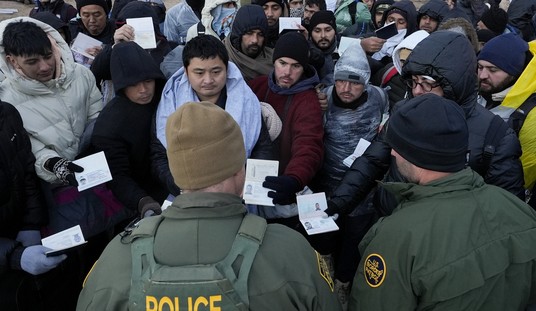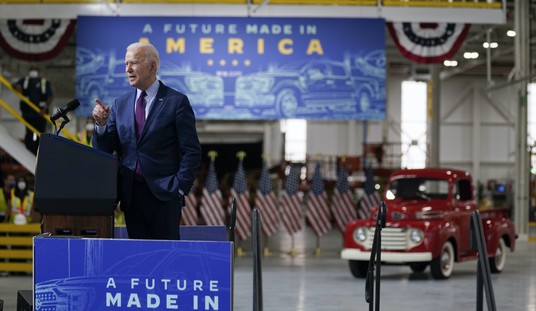The good news: Uber drivers will no longer feel exploited. The bad news: They’ll also no longer feel employed. Thanks to a court ruling that forces Uber to classify its drivers as employees rather than contractors, the ride-share firm’s CEO says the company will have to shut down in California at least until November, when a referendum allowing for a contractor relationship will go before voters:
Uber CEO Dara Khosrowshahi says the San Francisco-based company will likely shut down service in California temporarily if it’s forced to classify its drivers as full-time employees.
Khosrowshahi made the comment Wednesday during interview on MSNBC.
“If the court doesn’t reconsider, then in California, it’s hard to believe we’ll be able to switch our model to full-time employment quickly,” Khosrowshahi said.
The announcement comes days after a judge ordered ride-hailing giants Uber and Lyft to treat their California drivers as employees instead of independent contractors, a shift that would guarantee benefits like overtime, sick leave and expense reimbursement for workers who make up much of the freewheeling gig economy.
This comes from the state’s ludicrous AB-5 bill that has all but demolished the gig economy in California. The law forces businesses to hire people onto payrolls if they engage them for any more than a handful of transactions. The state legislature argued that contract work without benefits amounted to exploitation. For free-lance writers, artists, and other kinds of contract workers, however, the law has all but dried up their income as businesses avoid working with anyone in California.
A court ruled that this applies to ride-sharing services like Uber and Lyft, although the contract arrangement had actually been typical with taxi services for decades. That would also force a few other outcomes, Khosrowshahi made clear. As costs go up, so do prices, and so do restrictions on employment:
Employees, even part-time employees, are generally granted a slew of rights under California state and federal labor laws, while contractors are not. Those rights include workers’ compensation benefits, unemployment benefits and the right to unionize, among others.Last week, the California Labor Commissioner’s Office in Oakland also filed a similar lawsuit in Alameda County against Uber and Lyft for allegedly engaging in “systemic wage theft.” …
Khosrowshahi said that if the company is forced to adhere to the judge’s ruling, it would “take a significant amount of time” for the company to retool.
He said the new version of Uber in California would result in “much smaller service, much higher prices,” harking back to the early days of Uber, when it was largely a private car service that operated nearly entirely in city centers.
“That’s a reality, so it’s not a game of chicken one way or another,” he said. “It’s really up to the courts and we’re going to comply with the law, and we will look to get going again.”
The only possible way out of the vise is the referendum, Proposition 22, which would exempt app-based ride services from AB-5. Khosrowshahi wrote a defense of Prop 22 in the New York Times this week, arguing that drivers don’t want to be treated as employees — they want the flexibility of being contractors, and working when it suits them:
Why not just treat drivers as employees? Some of our critics argue that doing so would make drivers’ problems vanish overnight. It may seem like a reasonable assumption, but it’s one that I think ignores a stark reality: Uber would only have full-time jobs for a small fraction of our current drivers and only be able to operate in many fewer cities than today. Rides would be more expensive, which would significantly reduce the number of rides people could take and, in turn, the number of drivers needed to provide those trips. Uber would not be as widely available to riders, and drivers would lose the flexibility they have today if they became employees.
More important than what I think is what drivers think: In public surveys over the last decade, the vast majority of drivers have said they don’t want to be employees because of how much they value flexibility. A recent survey commissioned by Uber and other companies found that two out of three app drivers would stop driving if their flexibility was compromised.
This is because they understand the trade-offs between traditional employment and app work. Unlike traditional jobs, drivers have total freedom to choose when and how they drive, so they can fit their work around their life, not the other way around. Anyone who’s been fired after having to miss a shift, or who’s been forced to choose between school and work, will tell you that this type of freedom has real value and simply does not exist with most traditional jobs.
True enough … but that’s also true of many gig workers, not just in the ride-sharing industry. Why is the state of California interfering in those choices? In the current high-unemployment crisis of COVID-19, worries about exploitation might be more legit, but California passed AB-5 when unemployment was at all-time lows. There were more jobs for payroll jobs than applicants when the California legislature white-knighted gig workers.
And even now, perhaps gig work still makes sense for a lot of Americans, especially those with children locked out of closed schools. Gig work allows people to work around scheduling issues and adapt on the fly. Parents who need to support children through distance learning but still earn a living have better opportunities in some instances to do that by maintaining control of their work schedule rather than adapt to the necessities of a payroll-style work environment.
The real lesson from this episode is that AB-5 is a disaster. Let people choose gig work, or choose more traditional employment instead. Right now, California’s law allows workers only to choose no income at all, an all-but-predictable outcome of the perverse incentives created by AB-5.







Join the conversation as a VIP Member